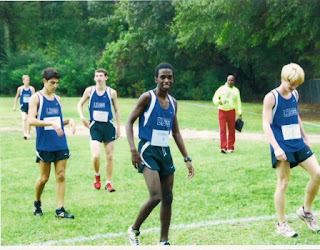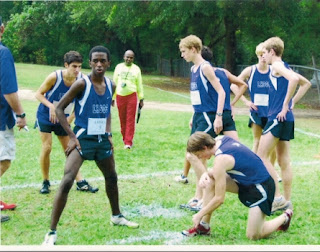 By Ben Oakley
By Ben Oakley Head of Sport and Fitness, Open University
Put "East African running" into a search engine and you'll get thousands of results exploring the question of what makes these long distance runners so good.
Everyone is searching for the secret explanation so what does the research evidence point to? There is not one simple answer but here are my thoughts.
In athletics terms many people associate East Africa with Kenyan and Ethiopian distance running. Intriguingly, the majority of these runners come from three mountainous districts beside the Rift Valley: Nandi in Kenya, the most successful district, and Arsi and Shewa in Ethiopia.
Some people say that since these runners and their forebears live and train at altitude, they're bound to be good. "Altitude natives", through long-term exposure combined with endurance training, have increased red blood cells which is one neat explanation of their excellence in endurance events.
However, scientists highlight that any advantages of living at over 2000m are also available to those in Mexico, the Andes, and large parts of central Asia.
So why are these clusters of running excellence found in only three districts?
For me, this is where history plays its part. Bale and Sang's prize-winning book on Kenyan running describes the influence of missionaries and the British army in promoting modern athletics.
Once this more formal type of running took root and success started to come, the tradition of distance running in the region became self-perpetuating. That is why, I think, East Africa has a running tradition and say, Mexico does not.
Do biological factors play a part?
Two convenient explanations are diet and/or "special" genes. We need not spend too long thinking about diet. Yes, a reasonably nutritious diet is needed to train hard but that is about all.
Genetics has received considerably more research attention. Some have suggested that East Africans' genes might be predisposed to endurance events but many studies have concluded the same thing – there is, at present, no evidence of this.
My reading suggests the efficiency of an East African runner's light and lean body could be a significant factor.
Some reports explain how good these runners are at dipping down like boxers or Tour de France cyclists to "make the weight" ie. deliberately losing weight before competing.
It also pays to be small and light in high temperatures since a body dissipates heat more easily – note that most Olympic venues are very hot (eg. Beijing, Sydney, Atlanta, Barcelona, Seoul etc.).
The term "running economy" has been used in studying the lower energy use of East African runners compared to Caucasians. The main explanation researchers put forward is that carrying a few less grams on the feet and ankles (a common feature of the East African body shape) means these runners require less energy to maintain a fast pace.
This efficiency argument makes sense, as do reports of the quality, not quantity, of their training. Tough sessions at very high heart rates are reported, which are apparently different to those used in other countries. So these runners tend to work hard and train differently.
In addition, many elite runners (about 50-70%) have run long distances in childhood to get to school: a very sound base for intense training in the future.
Economic reward
It is a cliché to talk of athletes finding a way out from poverty but picture this. You are in your mid-teens and are a good runner. In the next village someone has just won $2,500 in a minor half-marathon overseas – four times the annual salary of your parents.
You've seen how hard they train to achieve this and a member of your school has also won a senior championship medal to much acclaim; the medallist now supports the whole of their extended family.
You've already got a keen group of people to train with and people keep congratulating you on your progress. Would you give it a go?
In this environment I think talented runners are more likely to take on the commitment, leading to more chances of success, more role models, more talent scouts and increased training expertise.
Meanwhile, consider the psychology of competing against runners from East Africa. You would need to be mentally strong to counter the consistently attributed differences that I have outlined above.
Scientists have suggested that it is difficult to break the ongoing East African running stereotype; some runners of other races believe that they cannot compete with the East Africans whilst those from the region believe that they are better runners.
Of these explanations the influence of biology is hotly debated but overall the work ethic needed to succeed at the top level takes place in a social and economic milieu that, for me, is a major influence.
For a recent review of the topic try East African Running edited by Yannis Pitsiladis et al.
————-
Ben Oakley is Head of Sport and Fitness at the Open University and previously worked as the Olympic windsurfing coach, attending the Games in 1988 and 1992. He has worked in higher education since 1995 and published work on professional practices in coaching and sports policy.
Recently he has lead the development of online teaching materials in sport and been the academic consultant for the BBC Olympic Dreams series.





